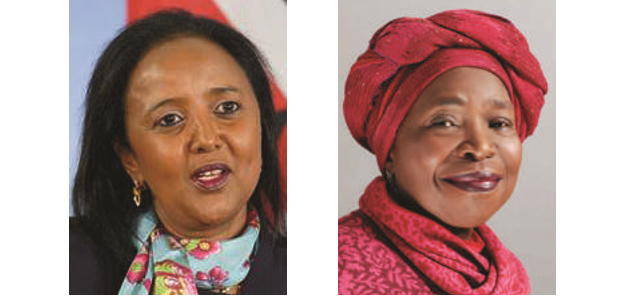
To illustrate, in the 14-year life of the African Union, the eastern region has produced only two chairpersons inspite of having the highest number of member countries – 15 countries. The western region which also has 15 member countries has had three chairpersons. But then central region, which only has seven member countries, has produced three chairpersons.
Regarding the position of AU Commission chairperson, the eastern and northern regions have not produced any in the 14 years of the organisation. Once again, however, the central region has just won another slot, just four years after another AUC chairperson from the region, Jean Ping from Gabon, handed the mantle to Nkosazana Dlamini Zuma of South Africa in 2012. The outgoing deputy chairperson, Erastus Mwencha, is Kenyan and he was ineligible to move a step up.So the tiny central region has two AUC chairpersons while the large eastern region is crying foul.
This was possibly supposed to be the time for the easterners. But they fumbled. At the start of the race, four candidates emerged; Agapito Mba Mokuy from Equatorial Guinea (central region), Dr. Specioza Wandira Kazibwe from Uganda (Eastern), Dr. Pelonomi Venson-Moitoi from Botswana [SADC] and Prof. Abdoulaye Bathily from Senegal (ECOWAS).
Although Kazibwe was endorsed as the regional candidate, some leaders continued presenting her as a Ugandan candidate and local politicians, civil society, and the media punched holes in her candidature. Soon consensus grew that she possibly was not the best candidate.
Indeed, when the AU leaders convened in July 2016 in the Rwanda capital, Kigali, for the 27th summit, the first decision they made was to re-open the call for candidates because none of the candidates had been found suitable.
Although the western (ECOWAS) bloc demanded the postponement over “quality of the candidates,” some observers say it was a tactic to retreat, strategise and have their candidate ready for the January vote.That is how the vote was pushed to January 2017 and Senegal’s Abdoulaye Bathily, Amina, and Mahamat entered the race.
But, according to Uganda’s Minister of State for International Affairs, Henry Okello Oryem, Amina could have suffered the same fate of her candidature being vilified at home as happened with Uganda’s Kazibwe.
Observers say there is no doubt that Kenya ran the best lobbying effort at the summit in Addis Ababa. President Uhuru Kenyatta reportedly played a lead role in the lobbying.
The Kenyan government is said to have reached out to 51 out of 54 AU member states and spent hundreds of millions of Kenyan shillings for Amina’s election committee members to criss-cross the continent to lobby leaders to vote for Amina.
Even the numbers – based on the traditional regional voting pattern of heads of state and government, appeared aligned in favour of Amina.
But Kenya’s vibrant social media was full of negativity towards Amina’s candidature with many Kenyans taking to twitter to mock their government’s decision to have Amina stand for the AU job.
Social media commentators argued that since Kenya was not good at handling its own internal affairs, it was not capable of providing leadership to the continent.
“What do you expect from people of other regions to think if the (EAC) candidates are not supported by their own people?” Oryem asked.
Regional considerations
Despite that, Amina appeared to have a great start because until now, the task has been to get a candidate who appeals to the block rather than individual countries. The popular strategy is for a candidate for an AU elective job to be fielded by a political, economic bloc, or lingual grouping. The regions designated by the AU include Southern Africa made up of (10) countries, Central Africa (7), Eastern Africa (15), and West Africa (15) and North Africa (6). These regions often vote as a bloc.
Elias Ntungwe Ngalame, an AU affairs analyst from Cameroon was recently quoted by The East African Standard, a Kenyan newspaper, saying Francophone countries always work as a team and this worked for Mahamat as opposed to Amina who comes from fragmented English-speaking Africa.
Mahamat is from the central region, which is the smallest with only eight countries. It is also the most fragmented and includes tiny countries like Equatorial Guinea, Gabon, and Congo. The DR Congo is the biggest, followed by Chad, Cameroon, and the Central African Republic.
Sabiti Makara, a professor of political science at Makerere University says at the point of strategy, Kenya underestimated the issue of Francophone countries which tend to band together unlike the Anglophone countries. Winning posts at the AU is a question of numbers and the French speaking former colonies are generally more than the English speaking countries and easily carry the day.
According to Makara, however, unlike the ECOWAS bloc whose members tend to move together on an issue, the EAC lacks cohesion on such issues. Some central and western region countries like Benin, Burkina Faso, Guinea-Bissau, Ivory Coast, Mali, Niger, Sénégal and Togo, have strong economic and political cooperation and use one currency (the CFA Franc). They also have French as a unifying language. In contrast, the eastern region appears fragmented economically, socially, and politically.
Amina talked about how Africa remains “deeply divided along Francophone and Anglophone lines.”
“It is sad that Africa is divided along language lines (English and French) and yet these languages do not belong to us,” she said.
“This is one thing that really needs to be addressed because it will continue to divide us and, as long as we are divided, pan-Africanism will be completely dead,” she said, “I think we are more divided than ever before.”
 The Independent Uganda: You get the Truth we Pay the Price
The Independent Uganda: You get the Truth we Pay the Price




My fellow countrymen are a prideful and envious lot. We will always take to twitter to shut someone down just because they dare to take charge. That’s what happened with our first lady half marathon 2017 edition. We shut down a worthy cause because of politics. Some recently tried it with Safaricom’s Bob Collymore and his wife.